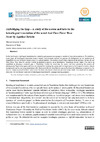Identificador persistente para citar o vincular este elemento:
https://accedacris.ulpgc.es/jspui/handle/10553/76123
| Título: | (A)bridging the Gap – A study of the norms andlaws in the intralingual translation of the novel And Then There Were None by Agatha Christie | Autores/as: | Moreno Tovar, Manuel | Clasificación UNESCO: | 570107 Lengua y literatura 550510 Filología |
Palabras clave: | Intralingual translation Abridgement Graded readers DTS Translation norms, et al. |
Fecha de publicación: | 2020 | Publicación seriada: | LFE. Revista de Lenguas para Fines Específicos | Resumen: | In the last decade, intralingual translation has started to gain momentum amongst a number of translation academics. Nevertheless, some types of intralingual translation remain largely undiscovered, such as the process of abridgement in the production of simplified versions of classic literary works (i.e. graded readers). This article subjects three chapters of the abridged version of And Then There Were None by Agatha Christie to qualitative analysis using Descriptive Translation Studies theory. The aim is to contribute to bridging a research gap in Translation Studies by examining the norms and laws governing the process of abridgement.Translation norms and laws are detected by situating the source and the target texts in their respective socio-cultural backgrounds and by analysing translation shifts. Relevant shifts are identified by means of a check-list of features elaborated on the basis of theory on graded readers, which classifiesthem into lexical, structural and informationshifts.The results of the analysis showcase the vast research potential of intralingual translation for language learning purposes. | URI: | https://accedacris.ulpgc.es/handle/10553/76123 | ISSN: | 2340-8561 | DOI: | 10.20420/rlfe.2020.313 | Fuente: | LFE. Revista de lenguas para fines específicos [eISSN 2340-8561], v. 26 (1), p. 51-68 |
| Colección: | Artículos |
Visitas 10
65
actualizado el 11-ene-2026
Descargas
76
actualizado el 11-ene-2026
Google ScholarTM
Verifica
Altmetric
Comparte
Exporta metadatos
Los elementos en ULPGC accedaCRIS están protegidos por derechos de autor con todos los derechos reservados, a menos que se indique lo contrario.
